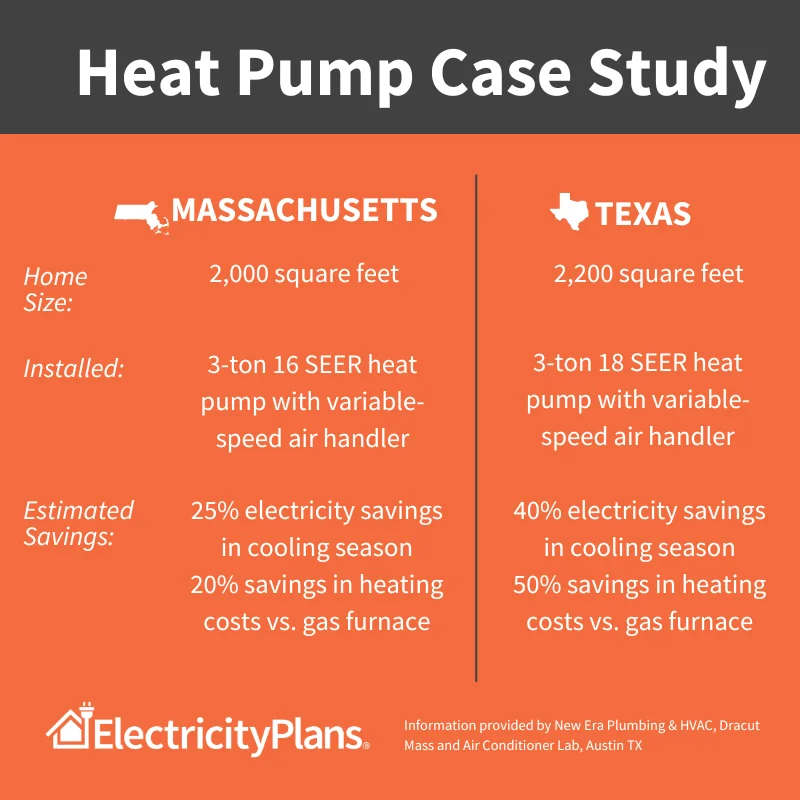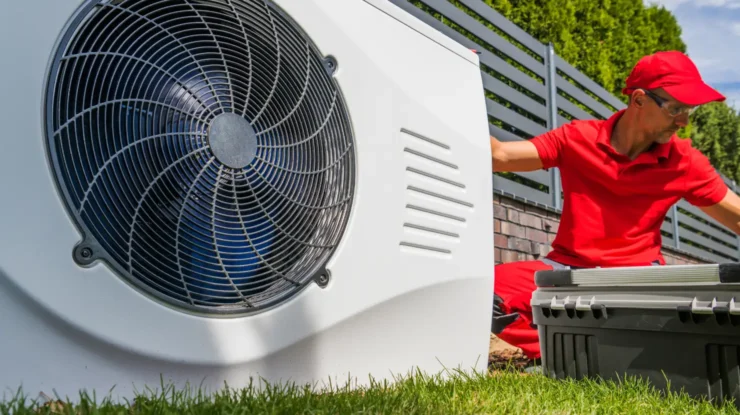When it comes to heating and cooling you home, you have options available. Instead of a traditional central air conditioning/furnace system, some homeowners are considering Air Source Heat Pump HVAC instead.
Heat pumps can be worth it because they can save money and improve efficiency, with an average savings of around $600 annually vs. a traditional HVAC system.
In this article, we review the basics and the pro/cons of an heat pump HVAC system.
What is a Heat Pump HVAC System?
A heat pump HVAC system is a type of heating and cooling system that transfers heat from one place to another.
A heat pump HVAC system consists of two main components: an outdoor unit and an indoor unit. The outdoor unit contains a compressor and a coil filled with refrigerant. The indoor unit contains a fan and another coil filled with refrigerant. A reversing valve determines if it’s heating or cooling.
- When operating in cooling mode, it’s removing heat and humidity from your home, and pushing the hot air outside.
- When operating in heating mode, it uses the energy in the cold outside air to generate heat. (There’s a good explanation of the physics of this process here.)
Benefits of a Heat Pump HVAC system?
Installing an air source heat pump HVAC system offers some great advantages vs. a traditional heating and cooling setup.
- Energy Efficiency. A traditional system uses energy to heat or cool air. A heat pump HVAC simply moves heat (energy) from one place to another.
- Cost Savings. Higher energy efficiency can lead to savings on electricity and natural gas bills. Typical savings are 30% on cooling costs and 40-50% on heating costs according to Energy.gov. Since heating and cooling your home can account for 30% of your electricity usage, that’s a big impact.
- Environmental Impact. Heat pumps contribute to a lower carbon footprint, especially if you’re currently heating with natural gas or home heating oil.
- Tax Benefit. Thanks to federal tax credits you may be eligible for rebates or deductions toward your system installation. Low income households (under 80% of area median income) can recover 100% of the costs up to $8,000. Moderate income households (80-150% of area median income) can recover 50% of the costs up to $4,875. Higher income households can get a tax credit for 30% of the total cost of the system (including labor) up to $2,000.
TIP: Before installing a new heat pump HVAC system, have an energy audit completed (or do a DIY home energy audit). For maximum energy efficiency, you’ll want to ensure your home has the proper level of insulation, weatherstripping and double-paned windows.
Drawbacks to a Heat Pump HVAC System
While the energy efficiency, cost savings and tax benefits are clear, there are some drawbacks to a heat pump HVAC system.
- Upfront Cost. The upfront cost of a heat pump system may be more than a traditional A/C and furnace combination. A typical heat pump installation cost is around $10,500 based on national averages. You will want to consider any tax benefits plus lower operating costs when making your decision.
- Noise. A common complaint is that heat pumps are louder to operate than a traditional A/C condenser unit.
- Suitability to the Environment. Air source heat pumps tend to work best in moderate climates. We’ll get into this more below!
Is a Heat Pump Right for My Home? (Where You Live Matters)
Heat pump technology has its limits. So it’s important to fully evaluate your home and your environment, and discuss options with your HVAC professional.
- Cold Climates. If you live somewhere that temperatures routinely reach below 5° Fahrenheit, you may need an auxiliary furnace to boost the efficiency of your heat pump HVAC system.
- Hot Climates. If you live somewhere that temperatures commonly reach above 90° Fahrenheit, you will need a high efficiency heat pump HVAC system with a higher SEER2 rating.
Here are a two examples, one in a cold climate and one in a warmer climate.

Case study examples provided by New Era Plumbing & HVAC, Dracut MA and Air Conditioner Lab, Austin TX.
The key here? Talk to your HVAC professional about the system requirements and what’s right for the climate where you live. A heat pump system may be the right approach for your home.
Additional Resources
